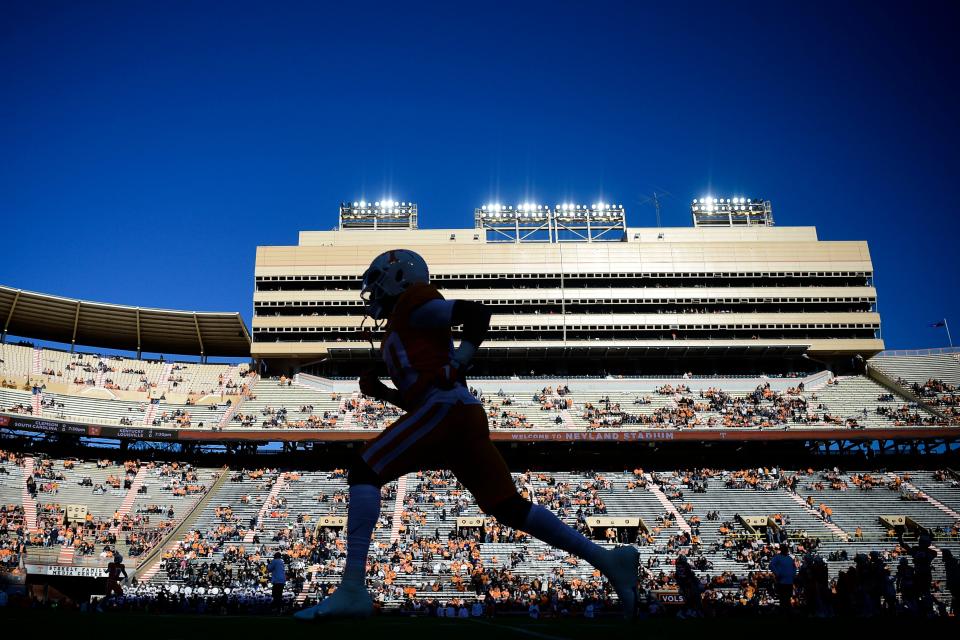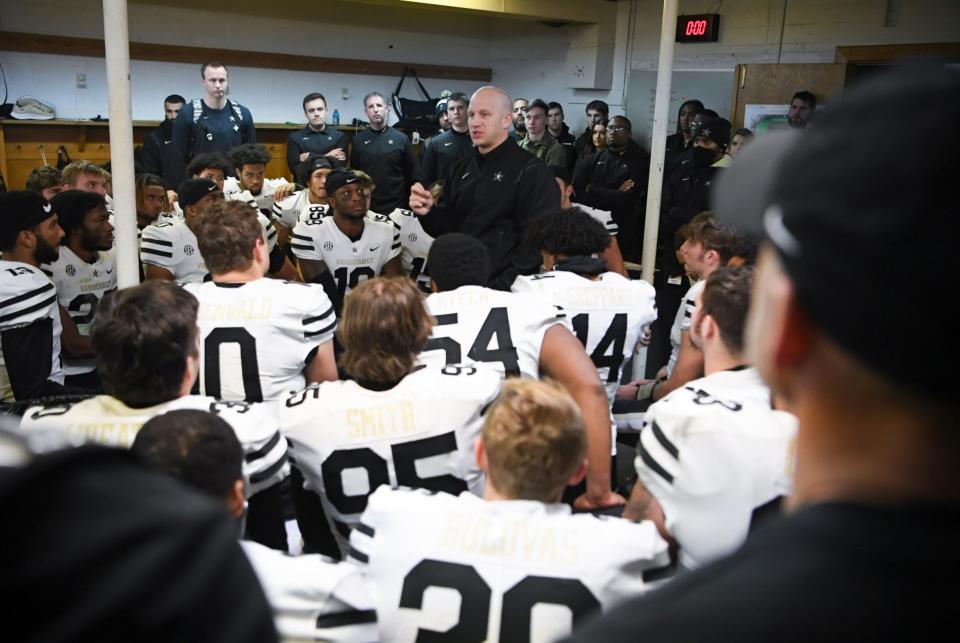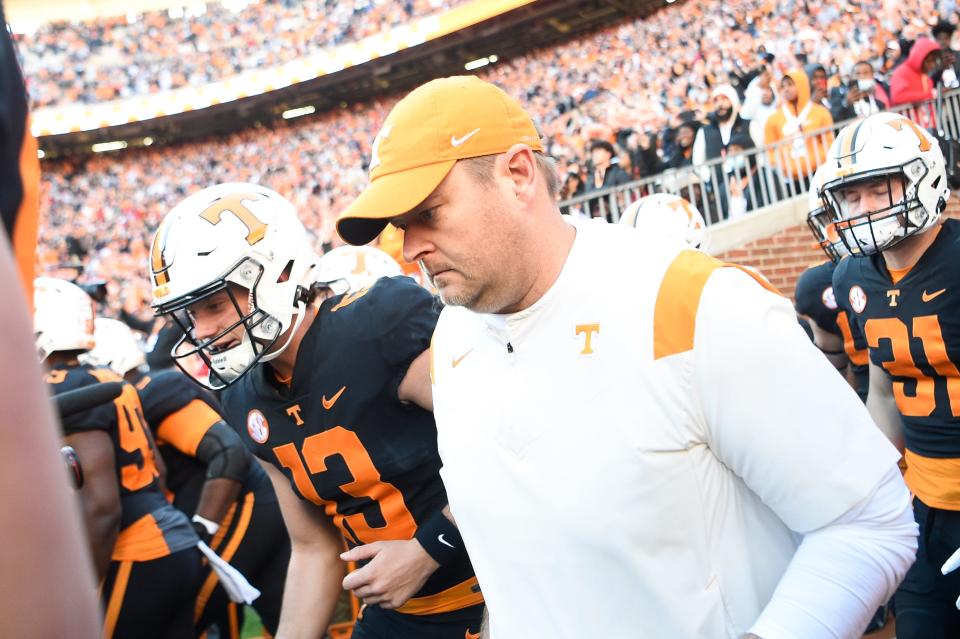How new Tennessee law allows colleges to facilitate NIL payments to players
New Tennessee legislation permits universities to have direct and public relationships with the collectives that pay their athletes for their name, image and likeness.
Last week, Gov. Bill Lee signed an amendment to the state law that will allow college coaches to attend NIL events, universities to fundraise for NIL collectives and NIL representatives to make presentations on campus to recruits and players.
Many Division I universities in the state — including FBS schools Tennessee, Memphis, Middle Tennessee State and Vanderbilt — must quickly adjust to capitalize on NIL opportunities to stay ahead of competitors in other states.
Alabama repealed its NIL law, so its universities are free to work directly with collectives. Florida, Kentucky and Virginia are among states trying to do the same with an amendment.
Tennessee universities can now facilitate NIL deals by working with collectives. The new law tears down most of the barriers that previously separated schools and the third-party groups that pay their players for their NIL rights within NCAA rules.
SEC schools like UT and Vanderbilt can be more efficient in getting NIL deals for their athletes by working with a collective. Group of Five schools like Memphis and MTSU can take a leading role in securing NIL deals with businesses if a collective isn’t doing so.
“(The changes in NIL law) are exciting and, more than anything, benefit the student-athletes,” said James Clawson, co-founder/CEO of Spyre Sports Group, the collective that pays many UT athletes for their NIL rights.
“The universities in Tennessee can be more involved in facilitating NIL opportunities for their student-athletes. Agencies like ours can have direct communication with the university, and that’s going to create more meaningful conversations on how to best position athletes for NIL opportunities.”
Why Tennessee law matters so much
The NCAA has few restrictions on NIL. After suffering losses in legal battles, it couldn’t afford to set too many rules when it opened the door to NIL activity on June 30, 2021.
By NCAA rule, a student-athlete’s compensation can’t be contingent on enrolling at a particular school or athletic achievement, although their level of performance can affect their value. That means NIL, technically, is not pay for play.

Otherwise, the NCAA defers NIL guidance to law of the state where each university is located. That’s why the Tennessee amendment — which passed the House in March and the Senate in April — was so critical.
The original Tennessee law prohibited an “institution, or an officer, director, or employee of the institution (from being) involved in the development, operation, or promotion of a current or prospective intercollegiate athlete’s name, image, or likeness, including actions that compensate or cause compensation to be provided to athletes.”
But the new amendment says an institution and its employees can be involved in NIL activities as long as they do not “coerce, compel, or interfere with an intercollegiate athlete’s decision to earn compensation from or obtain representation in connection” with an NIL opportunity.
In short, a coach and their player can be involved in the same NIL activities, as long as the coach doesn’t dictate the player’s decision to sign with that collective. The same rule goes for any university employee.
That sounds ambiguous. But that’s become the norm ever since the NIL entered college athletics 10 month ago.
“(College athletics) used to be the slowest changing industry in the world,” MTSU athletics director Chris Massaro said. “Now we’re getting used to rapid change, so we’re all adjusting on the fly.”
How NIL expansion may prevent infractions
A benefit of universities and collectives working together is that it adds an extra layer of compliance to protect the school and player from violating NCAA rules or state law.
In a statement, Memphis said the new law "allows us to be more hands-on in terms of education and guidance."
Most universities are already partnering with companies that provide NIL education and resources to their athletes.
For example, UT, Vanderbilt, MTSU, ETSU, Austin Peay and Belmont use INFLCR, a firm based on Birmingham, Alabama, which partners with every SEC school except Alabama.
Memphis, Chattanooga and Tennessee State use Opendores, a firm based in Lincoln, Nebraska, which claims to assist more than 70,000 athletes in exploring NIL deals.

But under the previous state law, collectives or businesses negotiating NIL deals could not work with the university. The amendment opens that communication.
“We currently have several checks and balances internally to make sure we’re following the law,” Clawson said about Spyre’s NIL discussions with UT athletes. “But now with the new amendment, we’ll be able to have even better communication with the (UT) compliance department.
“We just want to provide student-athletes with the best NIL experience possible, and this new ability to have open lines of communication with the university at all levels will help ensure that we’re all aligned in our vision.”
How Tennessee, Vanderbilt, Memphis, MTSU may change NIL strategy
Some schools are very protective of their NIL strategy. Neither UT nor Vanderbilt provided a comment to Knox News on the new NIL law or its impact on their athletic programs.
But expect both SEC schools to take an active role in raising NIL funds and developing plans to land deals for their student-athletes alongside collectives.
Mid-major schools can now seek out NIL deals for their athletes rather than helplessly hoping a third party does it.
Memphis previously added a staff member dedicated to helping athletes navigate the NIL space and developing their brand. And Massaro praised the amendment in expanding MTSU's strategy.
“Now we can help facilitate a little more, especially in smaller deals and group licensing,” Massaro said. “If we want to go to a manicure place where our women’s basketball team gets manicures and set up something for them, we can.
“Or if we can get something for our offensive line or our baseball pitchers as a group, that’s much easier.”
Every school knew the Tennessee law would change and planned accordingly.
Last week, MTSU announced a restructure of its Blue Raiders Athletic Association. It included a new giving category called Student-Athlete Impact Fund, which are “funds that go directly to MTSU student-athletes."
Massaro said it was initially planned as an Alston fund, which reimburses athletes for extra educational expenses such as computers and other equipment. But he said the new law might change it to an NIL fund, where supporters could give money earmarked for student-athlete payments.
The only difference is that NIL payments are not tax deductible like donations to an athletic association or facilities project.
How Tennessee coaches demonstrated NIL changes over three days
States are changing NIL laws regularly as collectives try to expand their reach and universities test the parameters in this new era of college sports. Sometimes it can be seen in real time.
Last Tuesday, at a Big Orange Caravan stop in Chattanooga, UT women’s basketball coach Kellie Harper described the limits of coaches in NIL under state law at that time.
“When we are talking to prospects, 90% of them are going to ask about NIL opportunities,” Harper said. “(But) I can’t facilitate those things.”

Lee signed the bill the next day. That night, at another caravan stop in Atlanta, UT football coach Josh Heupel was asked by a fan how the amendment could impact his coaches’ involvement in NIL activities.
Heupel, wide-eyed and taking a long pause, balked at discussing specifics just hours after the bill became law.
“(NIL) has got an opportunity to help our program,” Heupel said.
And on Thursday, at another caravan stop in Kingsport, UT men’s basketball Rick Barnes hinted at a widening door for coaches in NIL activities.
“The biggest part of what’s going on this time of year is dealing with the NIL,” Barnes said. “I have great faith in our administration. We’re going to know what’s going on. But every day you figure something out, watch what’s going on around you. And then you’ve got to quickly catch up with it.”
Reach Adam Sparks at adam.sparks@knoxnews.com and on Twitter @AdamSparks.
This article originally appeared on Knoxville News Sentinel: Tennessee law allows colleges to facilitate NIL payments to players
